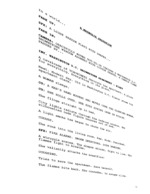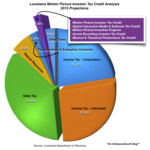How To Register Your Screenplay with the U.S. Copyright Office
A professional screenwriter, or even a novice trying their hand at creating a first screenplay, will want to register the copyright created in their work (a screenplay) with the United States Copyright Office (USCO).
“Copyright is a form of protection grounded in the U.S. Constitution and granted by law for original works of authorship fixed in a tangible medium of expression. Copyright covers both published and unpublished works.” – Copyright.gov

Ideas, and concepts do not qualify for copyright protection. You probably have heard this a million times. Ideas are worth nothing unless they are executed in a screenplay. Simple as that.
So, if you are looking to register your “idea” with the USCO, you are out of luck.
Single Application
The most common problem screenwriters have when registering their work is the registration option which they incorrectly select and, believe it or not, some screenwriters do not read the instructions or examples on the Electronic Copyright Office (eCO) Registration System.
First, setup an account. It is as easy as setting-up an Amazon account. Once your account has been setup and verified, you will start with a Single Application registration of your screenplay.

Registrations under a Single Application must meet ALL of the following requirements:
- One Work (the screenplay)
- One Author (you the screenwriter)
- ALL of the material contained within the screenplay must be created by you, the Author
- The author (you) and the owner/claimant (you) of this screenplay must be the same person, and that person must own all of the rights in this work (not you and your company)
- NOT a work-made-for-hire (nobody hired you to write the screenplay)
Now that we understand we are filing a Single Application, from the eCO Registration System dashboard, you will select Register One Work by One Author, considering all of the above requirements have been met.

A note about Works Made For Hire. This is an area of confusion with some screenwriters, but in practice, there should not be any confusion.
A “work made for hire” is either, 1. A work prepared by an employee (you, the screenwriter) within the scope of your employment. You were hired by a producer, a production company, etc. etc. etc. Or, 2. One of several specific types of works specially ordered or commissioned pursuant to a signed written contract where the parties agree that the work is a work made for hire (you wrote a version of a screenplay, an episode, etc. etc. etc.).
If ALL of the conditions listed above are not present, you must select Standard Application for registration. There is no gray area. You either meet all of the conditions, or you do not. This is where some screenwriters get confused. They select Standard Application and get all the way down to paying, only to find out the fee is $65 and not $45.
If you are paying anything other than $45 to register your copyright created in your screenplay, you are probably filing the wrong registration. Read the instructions and watch the videos.
As of March 20, 2020, the United States Copyright Office increased fees for registering screenplays. These fees have not increased in years. Funny, considering this is a government division.
Work of the Performing Arts
Another common mistake made by some screenwriters is they do not select the proper Type of Work when registering their screenplay. With all the requirements met above for Single Application, you must select Work of the Performing Arts.

“Works of the performing arts are works that are intended to be performed for an audience. This category includes a wide variety of creative works, including music, lyrics, sound recordings, scripts, screenplays, choreography, motion pictures, video games, and similar types of works.” [Emphasis added.] – Copyright.gov
Foreign Registrations
A common question for non-United States citizens who write screenplays and want to register their copyright in their work, is whether or not they can register with the USCO. Even though they live in another country.
The short answer is ‘yes.’
“Any work that is protected by U.S. copyright law can be registered. This includes many works of foreign origin. All works that are unpublished, regardless of the nationality of the author, are protected in the United States. Works that are first published in the United States or in a country with which we have a copyright treaty or that are created by a citizen or domiciliary of a country with which we have a copyright treaty are also protected and may therefore be registered with the U.S. Copyright Office. See Circular 38a, International Copyright Relations of the United States, for the status of specific countries, and Circular 38b, Copyright Restoration Under the URAA“ [Emphasis added.] – Copyright.gov
For those screenwriters in the United Kingdom, here is a great resource where to start: How copyright protects your work
It should be noted if you are a screenwriter in the U.K., there is no registrar of record such as the Library of Congress in the U.S.
“There isn’t a register of copyright works in the UK.”
Whether or not you should register your copyright in the United States at the Library of Congress (LOC), or not, is a decision you will have to make.
What would I do if I was an British screenwriter? I would register at the LOC. Think about your creative work and the cost benefit analysis of the cost of registration.
Final Note on Copyright and Registration
Another common mistake some professionals, as well as most novice screenwriters, make is the incorrect usage of the words copyright and registration.
In order to be taken seriously, or even better, present yourself as a professional screenwriter, you must know that a copyright is created the moment the letter hammer strikes the page and imprints a character.
If you have no idea what that means, you never used a typewriter.
If you use a laptop, the moment the screenwriting file is saved is when the copyright is created in your work. You do save often, don’t you?
Registration of the copyright created in your work is what you do at the USCO. You fill-out a registration form, upload your screenplay and pay a fee. In this Single Application case the fee is $45.
You cannot copyright a registration. You cannot copyright something. You can only create a copyright in writing your screenplay. You can only register a copyright.
“Your work is under copyright protection the moment it is created and fixed in a tangible form that it is perceptible either directly or with the aid of a machine or device.” – Copyright.gov
Enjoy!
– Stan




